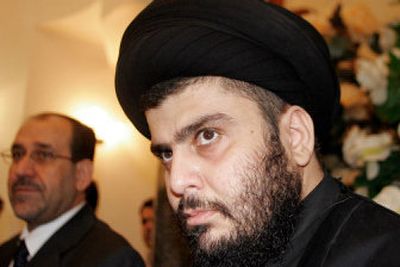Iraqi leader seeks Shiite clerics’ support

NAJAF, Iraq – Prime Minister Nouri al-Maliki met with Shiite Muslim clerical leaders in this city of seminaries and shrines Wednesday, seeking support for his beleaguered government.
Al-Maliki met Grand Ayatollah Ali al-Sistani, the Iraqi Shiites’ most revered cleric, and Muqtada al-Sadr, powerful leader of a political movement and militia considered a cause of Iraq’s security woes. Both are key backers of al-Maliki’s Shiite-dominated administration.
The visit came as al-Maliki faces rumors that the United States is seeking to replace him because of dissatisfaction with his attempts to pacify sectarian strife.
But al-Maliki, who received fresh assurances of support from President Bush on Monday, dismissed speculation he was in any danger of being pushed aside. “The Iraqi government … did not show up with the tanks,” he told reporters. “It came by the will of the Iraqi people through the stations of democracy, elections and the constitution.”
Al-Maliki’s handling of security, especially his seeming inability to rein in Shiite militias, has drawn suspicion from the country’s Sunni Arab minority, and has frustrated U.S. officials. The U.S. military this week complied with al-Maliki’s request to release a detained cleric who served in al-Sadr’s anti-American movement and is suspected of being a militia leader.
Al-Maliki defended the release, saying the country was moving to find “political solutions” for the militia issue and to make certain “nobody is arrested unless he committed a real crime against Iraq and Iraqis.”
With al-Sadr at his side during a second press appearance, al-Maliki also hinted he was seeking ways to lessen the influence of militias such as al-Sadr’s Mahdi Army, which often polices Shiite neighborhoods in the capital and southern cities. “We found a rejection of killing and holding weapons and support for the concept that the state provides security and protection for the citizens,” he said.
Al-Sadr called on Iraqis to avoid a sectarian “bloodbath,” and warned the U.S. to stay out of Iraq’s domestic affairs. “Many of the Americans’ interventions inside and outside Iraq have worsened the situation, whether in Lebanon, North Korea or other countries where security is worsening,” he told reporters.